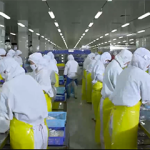New labeling rule paves way for GM salmon to enter US market
The U.S. government issued its long-awaited final rule on genetically engineered foods, which could pave the way for legal sales of genetically altered salmon.
The United States Department of Agriculture’s final rule requires food manufacturers, importers, and other entities that label foods for retail sale to disclose information about bioengineered (BE) food and BE food ingredients.
“This rule is intended to provide a mandatory uniform national standard for disclosure of information to consumers about the BE status of foods,” the agency said in the final rule.
In 2016, the United States Food and Drug Administration issued an Import Alert on AquaBounty’s GE AquAdvatange salmon because the 2016 Omnibus Appropriations Act said the agency cannot allow the introduction – or delivery for introduction – any food that contains GE salmon into interstate commerce until final labeling guidelines for informing consumers are published.
While USDA now issued the final rule for labeling of GE foods, the FDA still needs to provide labeling guidance on AquAdvantage salmon and then lift the Import Alert.
“This lays out the USDA's process for marketing labeling all foods produced by bioengineering. It hopefully will pave the way for the FDA to issue its guidance for labeling our product, but there is no assurance at the moment that will occur,” Dave Conley, spokesperson for AquaBounty, told SeafoodSource.
The new USDA rule will become effective 21 February - 60 days after publication in the Federal Register. Food processors do not have to comply with the new rule immediately, however. The voluntary compliance date ends on 31 December, 2021, and the rule becomes mandatory on 1 January, 2022.
AquAdvantage salmon is included on the rule’s list of BE foods that must be labeled as bioengineered foods.
“As other BE versions of the listed foods are authorized and become legally available, AMS will revise such listings to be more generic during the annual update process,” USDA said in the final rule.
Anti-GMO groups expressed concern and disappointment over the new final rule.
"In its current form, categorical exemptions prevent this law from delivering the meaningful protections Americans deserve. Highly processed ingredients, many products of new genetic engineering techniques such as CRISPR and TALEN, and many meat and dairy products will not require disclosure,” The Non-GMO Project Executive Director Megan Westgate said in a statement.
Numerous U.S. food products feature The Non-GMO Project Verified seal, which confirms that none of the ingredients in their product contain genetically modified organisms.
In addition, animal feed along with meat, eggs, and dairy from animals fed a GMO diet will not require a disclosure, according to the new labeling rule.
“Overall, many products containing GMOs will not be labeled, meaning that the absence of a bioengineered (BE) disclosure does not mean a product is non-GMO,” Westgate said.
“This deceptive rule will keep people in the dark about what they’re eating and feeding their families. It is meant to confuse consumers, not inform them,” Food and Water Watch Executive Director Wenonah Hauter said in a statement.
The rule is “filled with loopholes” that will allow manufacturers to use digital codes and other technology that make GMO disclosure more difficult for consumers than simple on-package labels, Hauter said.
“Many people don’t have access to smartphones needed to scan QR codes, or access to a good signal while shopping," Hauter said.
Food and Water Watch also criticized USDA’s reference to GMOs as “bioengineered” in the final rule.
“This is a deceptive strategy because most consumers don’t know what that means,” Hauter said.
In addition, the symbol that the final rule allows manufactures to use in their disclosure “suggest to consumers the product is natural and sustainable, when genetically engineered foods are anything but,” Hauter said.
Dana Perls, senior food and agriculture campaigner for Friends of the Earth U.S, called the new labeling rules “a disaster."
"[They have] huge loopholes that could keep consumers in the dark as new GMOs rapidly enter our food supply," Perls said. “The USDA will allow some of the most common highly processed GMOs to escape labeling, and other GMO ingredients that don’t contain detectable DNA, may be exempt."
The rules are also unclear whether food produced with new genetic engineering techniques, such as gene editing, will be exempt.
“All products made with genetic engineering, including ones made with gene-editing tools like CRISPR, should be regulated, assessed for health and environmental impacts and be clearly labeled,” Perls said.






Share